1.
I just woke up.
I’m on a plane in mid air and my watch tells me it is 9:30 am, but I think I’m just about crossing the timezone that puts me somewhere at 8:30 am. I boarded the flight from Boston International Airport at 7:00 am where I’m pretty sure I was already asleep for a good 2 hours (don’t ask me how I boarded the flight, I have very little recollection of that), because it just so happened to be one of those very rare times where I arrived to the airport early. Very, very early. Thinking my flight was at 5:00 am for some reason, I left for the airport at 2:30 am after a long night of drinks with the cast and crew of TAHRIR IS NOW, a night of songs from the hit musical WE LIVE IN CAIRO together with readings of fresh testimonies from Egypt. I read a few things of my own and also acted as the host for the evening, something I found out I’d be doing only a couple hours prior (it’s good to stay on your toes like that, I guess).
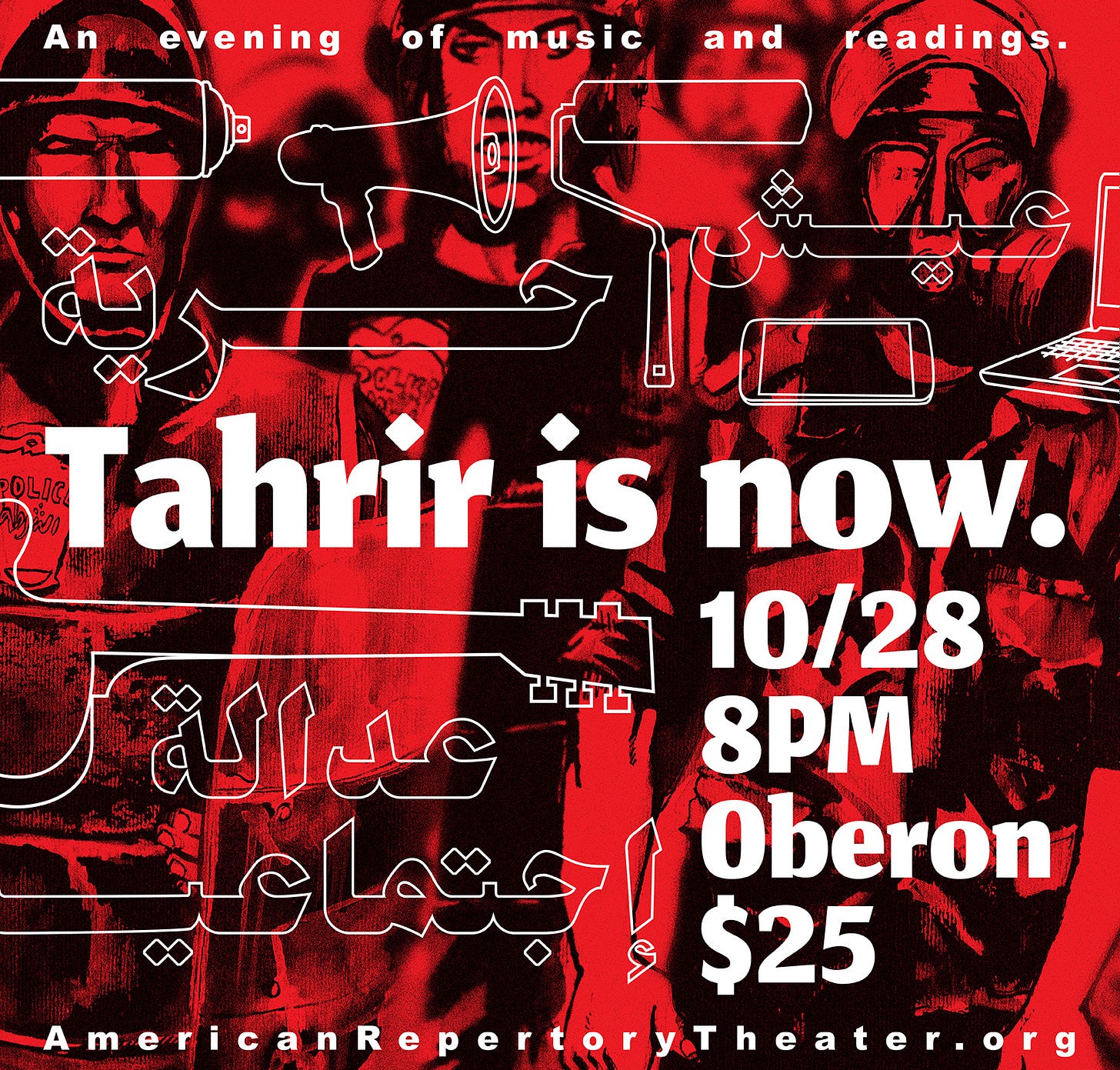
Here’s an excerpt from one of my readings:
Revolution.
Corporations will have you believe that a new car-hailing app is revolutionary, or a new meal-prepping scheme is revolutionary, or heck, that a reusable rocket is revolutionary. Revolution, however—real revolution—is structural. It does away with all the things that make the censorship of female nipples a common practice. It does away with the things that allow gaps in wages on the basis of sex, race, or age. It does away with everything that prohibits freedom of mobility and other basic human rights.
Yara Sallam is an Egyptian human rights researcher who spent 15 months in prison. This was 4 years ago but only recently could she muster the headspace to write about her experience in prison. She wrote about the need to occupy herself with daily activities just to ward off depression. She'd try to exercise, take on chores like laundry and cleaning the prison ward, and found genuine enjoyment in reading the daily paper. She took to making a list of pleasurable things that happened each day, but she also admits to sometimes not even having the energy to get out of bed. Because no matter how much you dupe yourself into thinking such daily distractions are great accomplishments, deep down inside you know that the greatest accomplishment of all would be your freedom.
Upon her release from prison, Yara tried to resume the life she had before going to prison. But... it was weird. It was weird going out to brunch with friends in Maadi again. It was surreal to reenter packed conference rooms at work, and to make sure rent was paid on time.
Reading about Yara's experience in and after prison got me thinking: Is life in jail just a microcosm of life outside of jail? Are we distracting ourselves with daily mundane things just to avoid the thought of not being able to change the larger structural things?
Are we all inmates in a much larger socioeconomic/cultural/political prison constructed over centuries?
And if that's the case, who are the wardens of this prison, and what will it take to bring it all crashing down? And more importantly, what do we want the world outside of prison to look like?
That is the question at the heart of the Egyptian revolution, the Lebanese revolution, the Iraqi revolution, the Palestinian revolution, the Sudanese revolution, the Algerian revolution, and every revolution to come.
We’ll be doing it again in NYC at Joe’s Pub on December 9th. Time and other deets to be determined, but I’m letting you know now in case you plan on being in NYC and would like to mark your calendars.
2.
One of the most powerful additions to the evening was the voice of a young lady from Lebanon named Lama. She sang a song by Mashrou’ Leila about a same sex couple that wants to be together, cook together, and raise each other’s children together. She also spoke a bit about the uprising currently underway in Lebanon—which needless to say I’ve been following closely on Social—and let me tell you, it is fire! They’re doing things that will certainly be informing strategies undertaken by future protest movements to come (which seems to be the case with every major protest movement in the past decade, don’t you think?).
When the Lebanese government tried to divide people up and pit them against each other (and if you know anything about Lebanon, you know that it hasn’t entirely healed from the trauma of the civil war which lasted from 1975 to 1990), the Lebanese responded by forming a human chain along the coast, connection North to South (the other thing you might know if you know anything about Lebanon, is that the entire country is more or less a coast).

When their Prime Minister finally started making concessions, they doubled down by furnishing their main square with rugs and sofas (and even a fridge) making it more than clear that they don’t plan on going anywhere and will continue their public sit-in until all demands are met: the resignation of “everyone means everyone” (one the most popular chants from the movement).
As a matter of fact, as I type this, reports of the Prime Minister’s resignation are indeed surfacing.
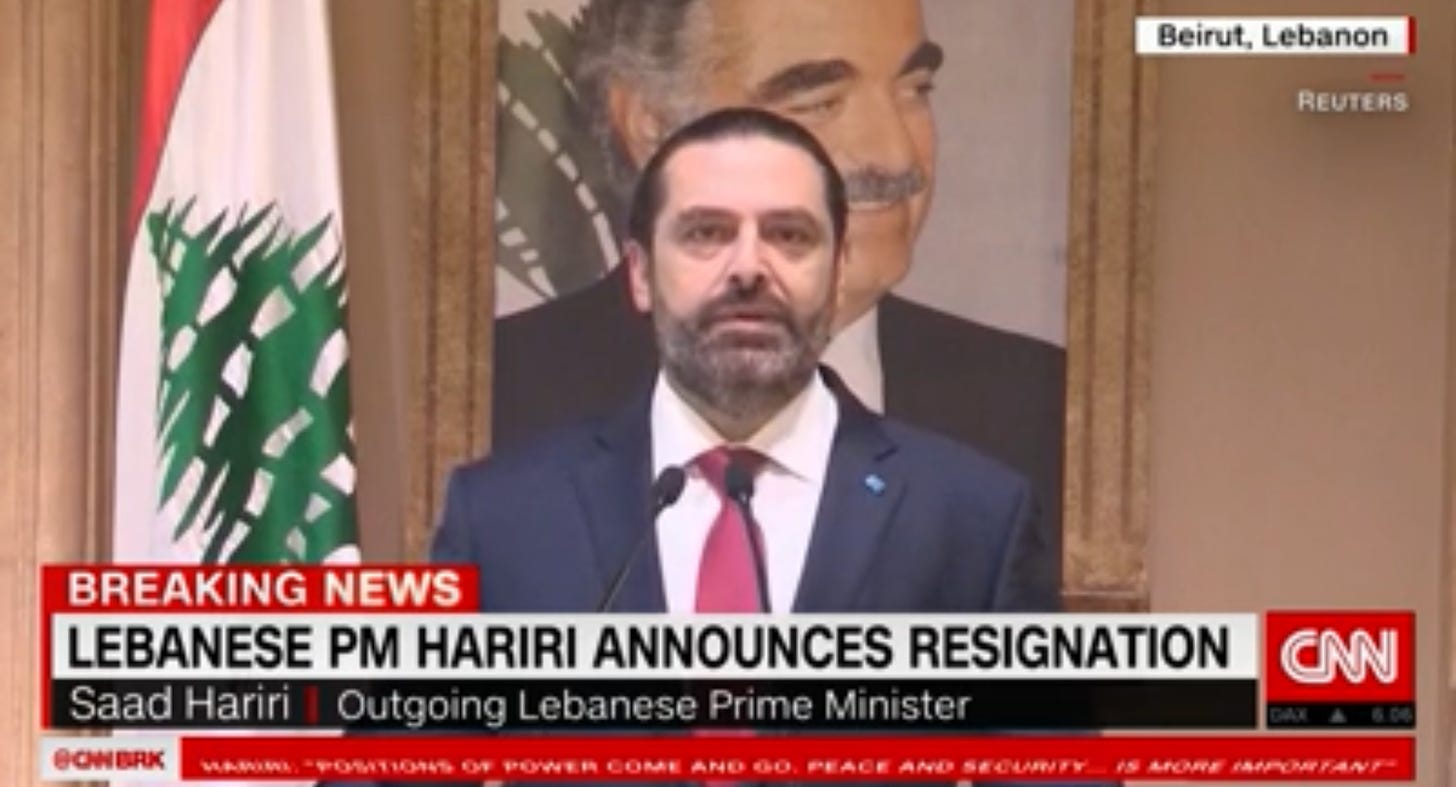
Notice the tacky attempt to invoke the spirit of his late father, former Prime Minister Rafik Hariri, by announcing the resignation against a huge backdrop of his daddy’s face (another thing you might know about Lebanon, is that the former Prime Minister was assassinated in 2005 and largely considered to be a great hero of Lebanon).
The big problem with Hariri junior’s approach is that it exemplifies how absolutely tone deaf he is. One of big things that’s been bugging the Lebanese people for a very long time now is that their government has essentially been run like a big mob-club, with positions of power handed out to friends and family members with complete disregard for qualifications or competence. Nothing could’ve hammered that point home more than Saad making sure his daddy watched over him as he broadcast his resignation.
Lebanon still has work to do, but this is a hugem huge step and it was accomplished beautifully.
3.
It was only a week ago when I was in DC for the Cultural Majlis hosted by Sultan Al Qassemi. Glad to report that it was a full house and went very very well.
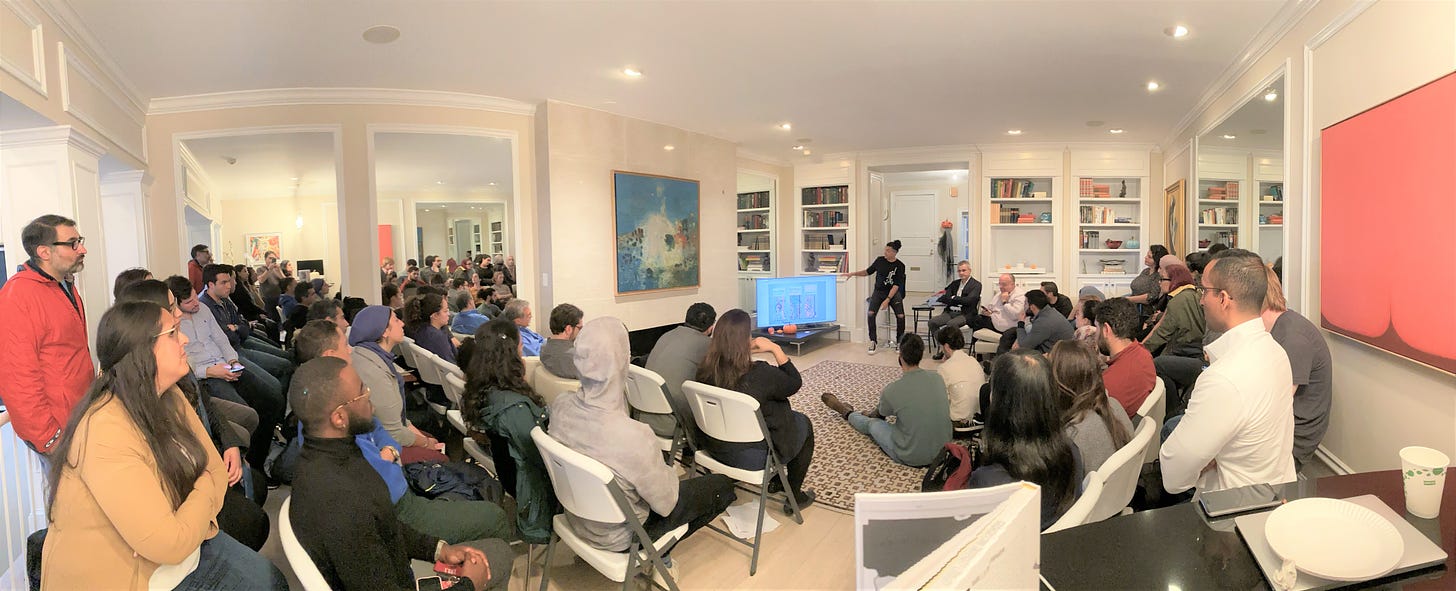
Not sure I can claim the prize for the smartest talk, but I think I scored pretty well on the scale of most inappropriate talk. 😇
Earlier in the day, I also had the chance to speak at Sultan’s class on Middle Eastern Art.
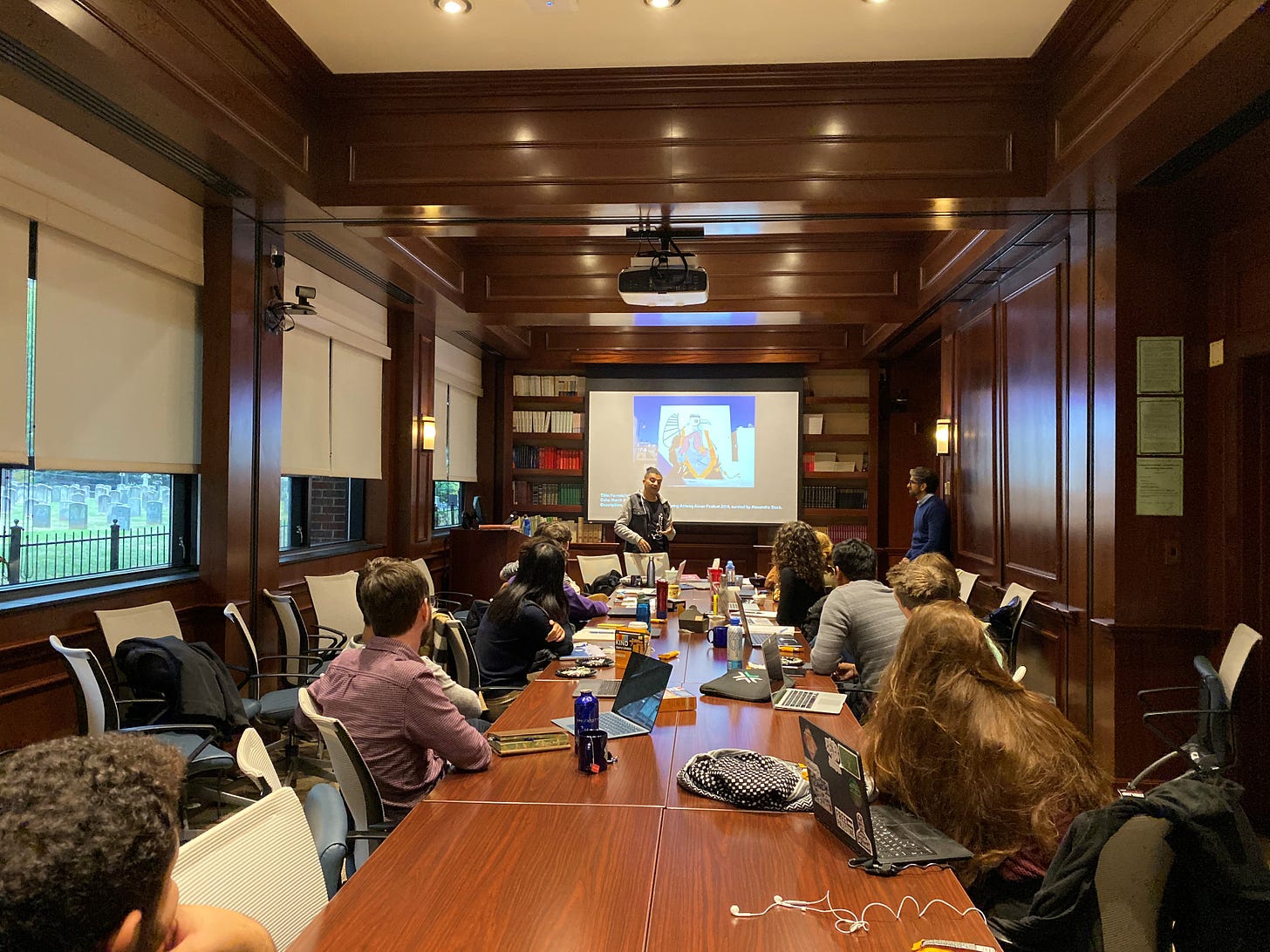
The great Egyptian author and Nobel Laureate Naguib Mahfouz once said:
You can tell if a person is clever by their answers, and you can tell if a person is wise by their questions.
Sultan’s students had both great questions and great answers. Love being around smart students, for it always makes the future look that much brighter.
4.
Meher Ahmad wrote a great introductory piece for the Baffler on the long and complicated relationship between the IMF and Pakistan, and why new PM Imran Khan couldn’t end it despite promises to do just that.
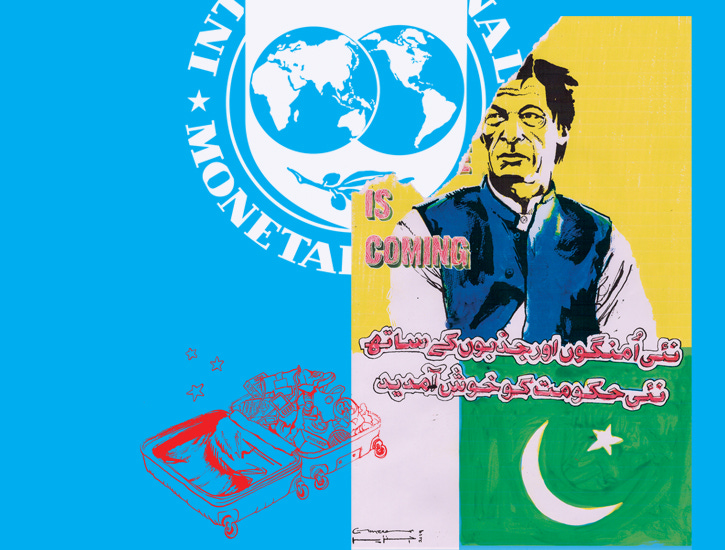
I did the illustration for it, and yes, it is very much a flip-flop.
5.
Two more highlights from my very short 2-night stint in DC was getting to hang with Josh MacPhee and—separately—Elliott Colla.
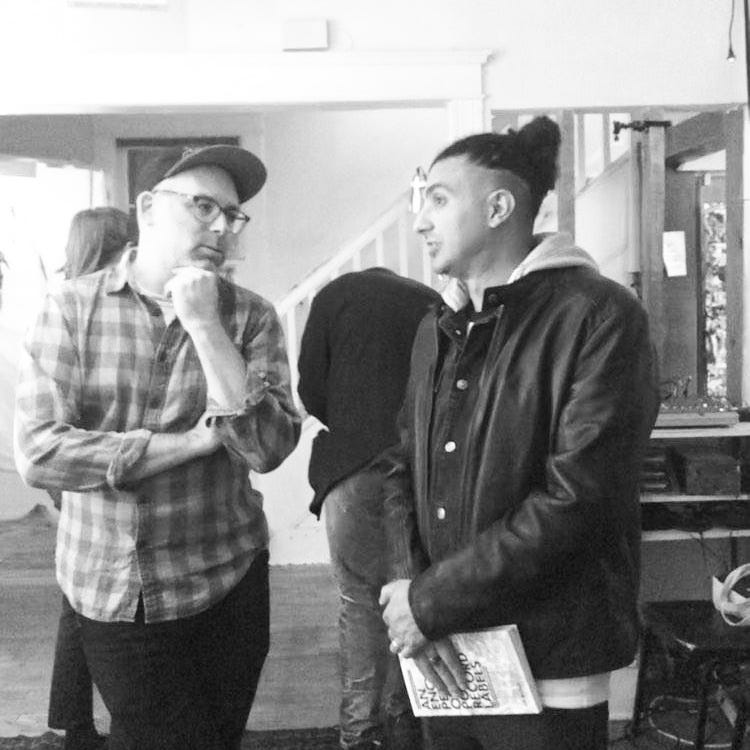
Josh had a book launch and music-listening event at a very grassroots spot called Rhizome, which is essentially a small house converted into an event space; seats and speaking/screening area downstairs, right next to the kitchen, and gallery spaces upstairs, with admission being donations-based. It reminded me somewhat of the informal spaces I was familiar with in cities like Cairo, Beirut, and Berlin. Every city ought to have at least one. To quote Sara Ahmed from her 2017 book, LIVING A FEMINIST LIFE:
To be part of a movement requires we find places to gather, meeting places. A movement is also a shelter. We convene; we have a convention. A movement comes into existence to transform what is in existence. A movement needs to take place somewhere.
The book Josh was launching, AN ENCYCLOPEDIA OF POLITICAL RECORD LABELS, couldn’t have been more suitable for a music-listening party because what Josh did was play rare leftist records of many eras from across the world. Really good records I might add, and in the process of that you discover that there’s this big super important chunk of music history you had absolutely no idea about. Between each song, Josh would tell us a bit about the record label and the circumstances surrounding the specific recording. Really interesting history, some of which is documented in his fine 196-page book.
As an aside, there’s a bit about the publisher, Common Notions, in the back that I really, really love:
By any media necessary, we seek to nourish the imagination and generalize common notions about the creation of other worlds beyond state and capital.
I really love that.
Elliott Colla is a professor of Arabic literature at Georgetown University. He has a personal collection of old printed matter, predominantly from Cairo, which I had the opportunity of probing. For example:
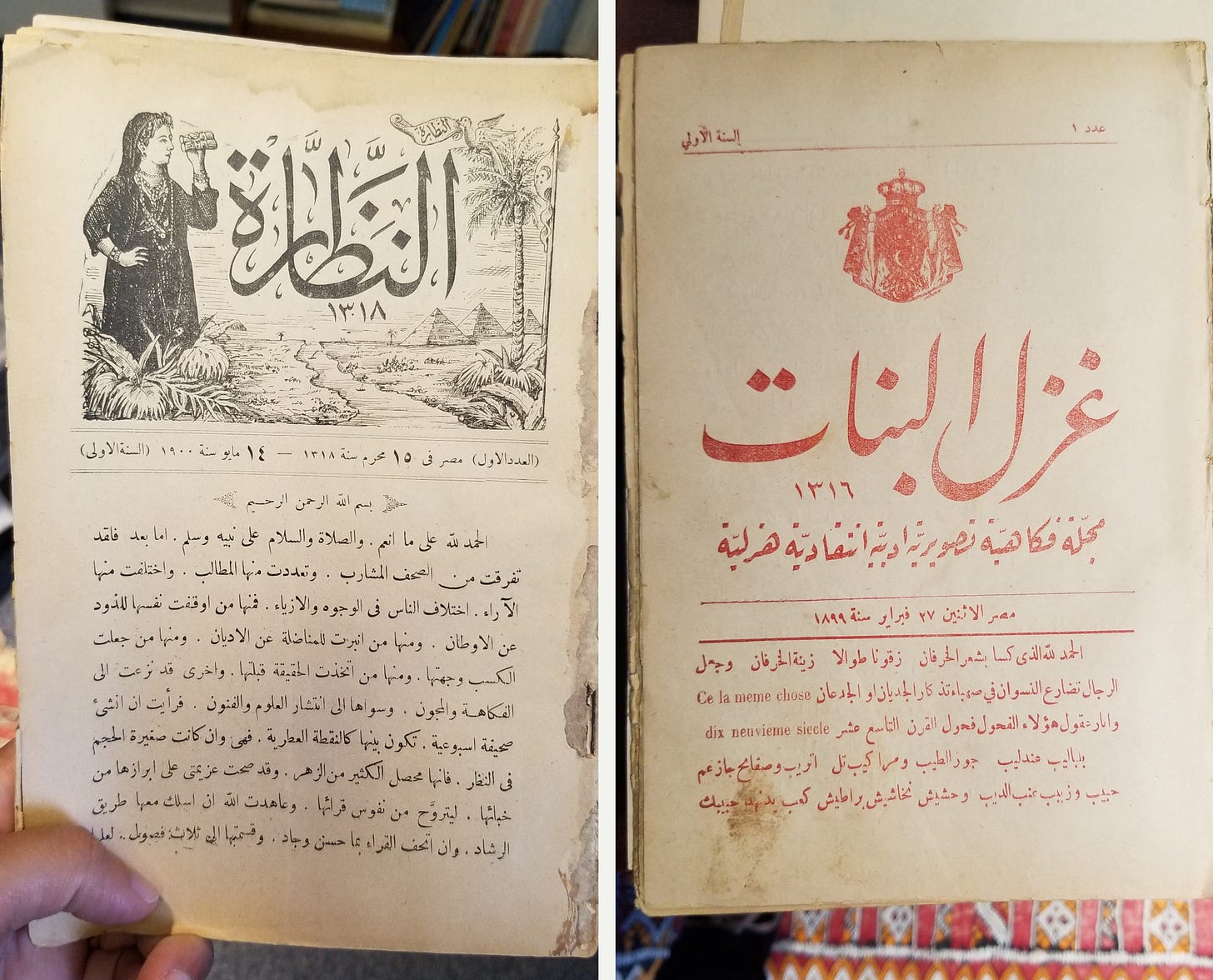
To the left is AL-NADHARA (“The Specs”), first issue circa May 14, 1900. In the introduction on the front, the editor writes about his intent to create a weekly publication, “not quite a torrent of rain, but enough dew to foster the growth of an occasional rose”, which makes me wish I had a regular publishing operation of some kind set up.
To the right is GHAZL EL-BANAT (“Cotton Candy” the Arabic terminology for which is “Girls’ Flirtations”). Also a first issue, dating back to February 27, 1899, and it is self-described as an “illustrated, satirical, literary, and critical magazine”!! Do publications covering all that ground even exist anymore?
Elliott is also a novelist. He gifted me his first (and so far only) novel, BAGHDAD CENTRAL, which the UK’s Channel 4 recently picked up to adapt into a six-part series, after which the US’s Hulu picked up from the UK’s Channel 4. All this is only just happening, even though the novel was published over 5 years ago. I’m only about 30% in and I am very, very hooked. It suffers a bit from some very generic cover art, which makes it come off as one of the many run of the mill books written by American G.I.’s following the American invasion of Iraq. And although it does indeed take place during America’s occupation of the country, it in fact has little to do with American G.I.’s and instead follows an Iraqi ex-cop who is forced to get back to work in the most harrowing way imaginable. It’s got its noirish vibes, but our protagonist here ain’t just another nostalgic copy of some L.A. cop in a dumb hat. Like Elliott, he’s a lover of Arabic poetry, and bits of his poetic memory seem to come out at exactly the right moments. It’s really powerfully written, and I suspect that once the adaptations are screened (granted that they’re actually good), and the book is reprinted with new cover art, and the sequel is published (which Elliott is in fact writing as we speak), BAGHDAD CENTRAL will finally get the recognition it deserves.
Ganzeer
October 29, 2019
Somewhere between Boston and Houston
P.S. Not gonna lie, quite jealous seeing some of my Cairo homies getting to kick it with the Paul Pope himself.


